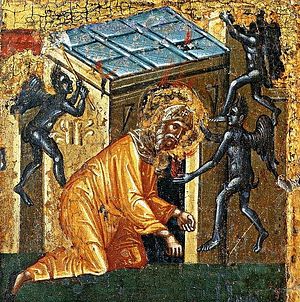Sometimes clergy and seminarians will have a slip of the tongue by referring to the seminary as a “cemetery.” This is usually followed by an ironic chuckle, as if to say, “Yes, sometimes seminary is a place of death.” Antony the Great, 4th century Egyptian Christian, had a similar experience during his early spiritual formation.
 In Athanasius’s biography of Antony (all quotes are from Robert Gregg’s Athanasius: The Life of Antony and the Letter to Marcellinus), he writes that as part of Antony’s spiritual formation, he has a friend shut him in a tomb outside of the village to spend the night. During the night, Antony is assaulted by demons, which tempt him and beat him senseless, wounding him so severely that he is unable to stand.
In Athanasius’s biography of Antony (all quotes are from Robert Gregg’s Athanasius: The Life of Antony and the Letter to Marcellinus), he writes that as part of Antony’s spiritual formation, he has a friend shut him in a tomb outside of the village to spend the night. During the night, Antony is assaulted by demons, which tempt him and beat him senseless, wounding him so severely that he is unable to stand.
The next morning, his friend discovers Antony’s body and, believing that he is dead, carries him into the village. The villagers gather around Antony in vigil and eventually all fall asleep. Only his friend remains awake.
When Antony awakens during the night, he is in too much pain to return to the tomb on his own. At his request, Antony’s friend carries him back to the tomb and lays him on the floor.
This night, the demons burst through the walls and ceiling of the tomb, appearing in the guise of fierce wild beasts, who threaten but cannot harm him. Antony taunts them for their impotence, and they depart. The tomb is restored to its original appearance. Antony is then visited by a “certain beam of light descending toward him . . . he was so strengthened that he felt that his body contained more might than before.” (Gregg, 39)
Here are a couple of observations about this experience. In faith that God was prompting him to undertake this challenge, Antony left his village to be challenged and tested in the tomb. As Gregg notes in his Introduction, “Warfare with the demons is at the same time warfare with the self, and this contest has meaning only as it results in the attainment of divine empowerment and favor.” (Gregg, 4) It is a familiar story in the life of the seminary.
We, too, come here believing that God is prompting us to undertake this challenge to progress in spiritual formation. Rather than finding a comfortable space that reinforces who we have become so far, we discover we are called into a position of vulnerability and, like Antony, are assaulted by our fears, doubts, old wounds, temptations, shames, and perceived flaws. Sometimes, we are so beaten down, that we cannot stand on our own.
What made the passage one of transformation for Antony offers reassurance in the seminary, as well. First, the intention to begin is grounded in faith. We are prompted by deep stirrings that the Holy Spirit is at work. There is a willingness to be tested to and beyond our current limits, trusting that God is involved even when (as Antony discovered) it’s not clear how.
Second, the support of a faithful friend from outside the community is essential to surviving the passage through temptation and trial. Having distance from our struggles allows the friend to support us without they themselves being pulled into the struggle. They can be objective about the benefits of the struggle when perhaps we are not so sure.
Finally, while in the passage our reliance on old beliefs and communities can be stripped away, on the other side we hope to find our own “certain beam of light” from God, which reassures and strengthens us. In the end, as Antony emerges “so strengthened that he felt that his body contained more might than before, so also we hope to emerge stronger and more able to serve.
Antony’s struggle in faith is our struggle in faith. Antony’s new strength in Christ is our new strength in Christ.
Sense that the Holy Spirit is prompting you to go deeper? Come to the cemetery; sorry, I meant the “seminary.” Slip of the tongue?
After thirty-five years, Parker Jameson retired from parish ministry in mid-2016. He and his wife, Paula, are now listening to the new directions they are being called in by the Spirit. He serves as an adjunct faculty member for Contextual Education at the seminary.

